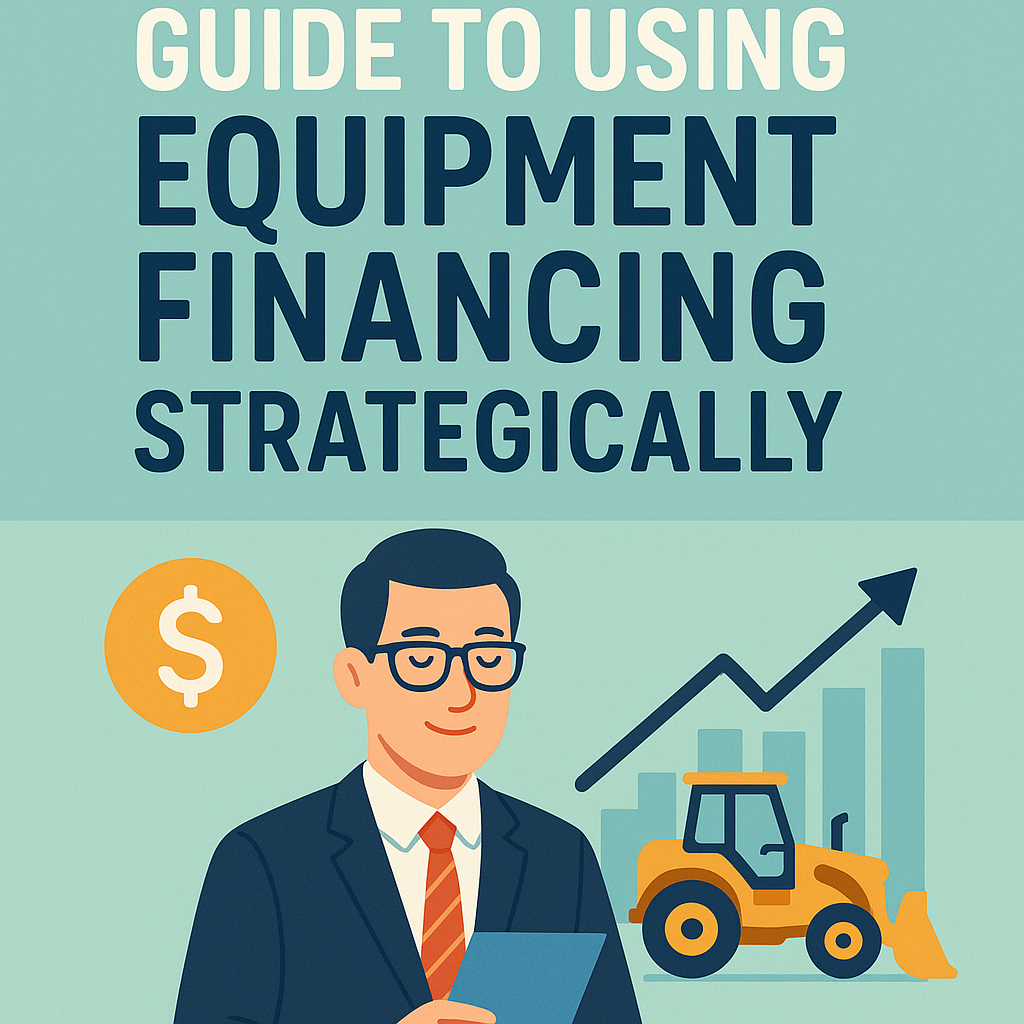5 Equipment Financing Myths Holding Your Business Back

Investing in the right equipment and technology can significantly enhance a company’s efficiency and growth potential. However, the high cost of essential assets often makes this challenging, especially for small businesses and startups. Equipment financing offers an ideal solution, allowing businesses to acquire necessary tools and resources without a large upfront investment. Despite its benefits, several misconceptions surrounding equipment financing often prevent businesses from fully utilizing this opportunity. Below, we break down five common myths that may be holding your business back from reaping the rewards of equipment financing.
Myth #1: “Equipment Financing is Only for Large Corporations”
A common myth is that only large corporations with substantial revenue and assets can qualify for equipment financing. Many small and medium-sized businesses (SMBs) believe that financing companies are unlikely to work with them due to their limited capital or credit history. This misconception leads many smaller businesses to forgo financing altogether, missing out on growth opportunities.
The Truth: Equipment financing is highly accessible for businesses of all sizes, including small businesses and startups. Many financing providers have tailored programs specifically for small companies, with flexible requirements and payment terms. This makes it easy to finance a range of essential assets—from machinery and technology to `—on a budget that suits each company’s unique financial situation.
For new and growing companies, equipment financing startup options can help them gain access to technology or equipment they couldn’t otherwise afford. For instance, an emerging business could use financing to acquire essential technology for its operation, like computers, servers, or point-of-sale (POS) systems. Instead of facing a large upfront cost, companies can gradually pay for these items over time, allowing them to preserve cash for other needs, like payroll, marketing, or expansion.
Additionally, for companies interested in outsourced server support or desktop support outsourcing, equipment financing makes it feasible to secure robust IT infrastructure without heavily impacting their budget. Financing allows smaller companies to grow at their own pace without missing out on essential assets that drive productivity.
Myth #2: “Financing Equipment is Too Expensive in the Long Term”
Another common myth is that financing equipment will result in higher costs due to accumulated interest, making it a less economical choice than purchasing equipment outright. Business owners often believe that these additional fees outweigh the benefits of spreading the cost over time.
The Truth: Although financing does include interest, its structure and benefits make it a financially sound decision for many companies. By breaking down the cost into manageable monthly payments, businesses can free up cash for other critical expenses, such as inventory, payroll, or marketing. Additionally, financed equipment can often generate revenue that offsets its cost. For example, the increased productivity from new machinery or the efficiencies of updated technology can improve profitability, covering the monthly payments.
Another financial advantage of equipment financing is its potential tax benefits. In many cases, financing arrangements qualify for tax deductions, allowing businesses to write off a portion of the equipment’s cost each year. This deduction can substantially reduce a company’s taxable income, ultimately lowering the overall cost of financing.
This approach can be particularly valuable for companies with significant IT needs, like those seeking Irvine IT support or tech-heavy solutions. Instead of paying upfront for costly technology, businesses can enjoy these assets immediately while managing payments on a schedule that fits their revenue cycle. This way, equipment financing actually serves as a means to protect cash flow and maintain stability.
Myth #3: “Only Traditional Equipment Can Be Financed”
A pervasive misconception is that equipment financing only applies to traditional physical assets, like vehicles, heavy machinery, or construction equipment. Businesses requiring nonphysical assets, such as IT infrastructure or industry-specific technology, often assume that these resources don’t qualify for financing.
The Truth: Equipment financing has evolved to cater to modern business needs and can cover a diverse range of items, including software, IT systems, and communication tools. This flexibility means that businesses can finance not only traditional assets but also critical technology and services that allow them to stay competitive.
For example, companies today can use financing to secure secure VoIP solutions for sensitive industries. Industries that manage confidential data—such as healthcare, finance, and legal—rely on secure communication channels to ensure compliance and protect sensitive information. Financing such technology allows these businesses to implement necessary security measures affordably and efficiently.
This adaptability extends to other technology and software solutions, including specialized tools for data management or analytics. Companies looking for company outsourced server options can utilize equipment financing to cover the costs of updated servers, advanced software, and cybersecurity measures. Financing offers an affordable pathway to acquire tools that support data-driven decision-making, operational efficiency, and, most importantly, security—making it suitable for a variety of sectors and asset types.
Myth #4: “Equipment Financing Hurts Cash Flow in the Short Term”
Some business owners worry that adding financing payments will put a strain on their cash flow, making it harder to cover other expenses or save for future investments. This misconception often discourages companies from exploring financing options, even when they need critical equipment to grow.
The Truth: Equipment financing is structured to support rather than hinder cash flow. By spreading out payments, businesses avoid the need for a single, large cash expenditure, which can strain resources. Financing allows companies to maintain cash reserves for essential day-to-day needs or to manage unexpected expenses, creating a more balanced financial picture. Additionally, many financing providers offer options for deferred payments, allowing companies to start using equipment immediately but pay later, when they’re generating revenue from the new assets.
For example, a business that relies heavily on technology for daily operations could benefit from financing to upgrade its server or IT support. A desktop support outsourcing service, for instance, could be financed over time rather than as a one-time cost, ensuring access to up-to-date systems while keeping cash available for other operational costs. This approach allows businesses to improve efficiency, reduce downtime, and increase productivity without disrupting cash flow.
Equipment financing also has the advantage of predictable monthly payments, which can simplify financial planning and cash flow management. By making it possible to budget around a fixed monthly cost, companies can focus on revenue growth rather than worrying about large one-time expenses.
Myth #5: “It’s Better to Wait Until I Have Enough Capital to Buy Equipment Outright”
Some entrepreneurs believe it’s financially responsible to save enough capital to buy equipment outright. They may assume that waiting until they can afford the full purchase price is safer and avoids the risk of debt.
The Truth: While saving for a big purchase is often wise, waiting too long can limit business growth, especially in industries that are fast-paced and reliant on up-to-date technology. Equipment financing provides businesses with access to critical tools right away, enabling them to expand and operate more efficiently without depleting cash reserves.
For example, waiting to acquire necessary equipment or technology could mean missing out on new clients or opportunities. Businesses in need of Irvine IT support or improved communication systems can use financing to stay current without sacrificing cash reserves, keeping them competitive in a rapidly evolving market. Equipment financing allows businesses to maintain a steady growth trajectory without waiting for capital to accumulate, ensuring that they’re ready to take on new opportunities when they arise.
In fast-paced sectors where advancements are frequent, financing also provides the flexibility to update or replace equipment without the risk of being “stuck” with outdated assets. This is particularly beneficial for technology-driven companies or those in sectors where timely updates are essential for compliance and operational efficiency.
Advantages of Equipment Financing for Your Business
Equipment financing offers many benefits that can help businesses grow, remain competitive, and operate efficiently. By eliminating large upfront costs, providing flexible payment options, and supporting tax deductions, equipment financing allows companies to acquire necessary assets without disrupting cash flow. This financing option isn’t limited to a specific type of asset or business size. Businesses of all sizes and industries, from tech startups to established firms, can take advantage of equipment financing to acquire tools they need today.
From covering the costs of outsourced server support to investing in secure VoIP solutions for sensitive industries, financing provides businesses with a practical way to meet their equipment needs while managing cash flow effectively. By dispelling common myths, business owners can make better-informed decisions about equipment financing and leverage this tool for sustainable growth.
Equipment financing allows companies to invest in cutting-edge technology and essential equipment at the right time, supporting operational efficiency and enhancing their market position. Businesses can focus on growing and scaling without the worry of exhausting their resources, setting a foundation for long-term success.
FAQs
Q1: Can small businesses qualify for equipment financing?
A: Absolutely. Equipment financing is accessible to businesses of all sizes, with providers offering tailored financing options for small businesses and startups.
Q2: Can nontraditional assets like software or IT equipment be financed?
A: Yes. Equipment financing extends to a wide variety of assets, including computers, software, and even secure VoIP solutions for sensitive industries that require advanced technology.
Q3: Does financing equipment negatively impact cash flow?
A: Equipment financing is designed to support cash flow by spreading out payments over time, allowing companies to keep reserves for other critical expenses and manage budgets effectively.
Q4: Are there tax benefits to equipment financing?
A: Many financing arrangements qualify for tax deductions, allowing businesses to reduce taxable income and lower the overall cost of financing.
Q5: Is it better to wait until I have enough capital to buy equipment outright?
A: Waiting often limits growth. Financing provides immediate access to essential equipment, allowing companies to grow and operate efficiently without waiting for large amounts of capital.
Q6: What are the main advantages of equipment financing?
A: Equipment financing allows businesses to avoid large upfront costs, manage cash flow, improve productivity, and potentially enjoy tax benefits, making it a flexible and cost-effective investment in business growth.




No comment